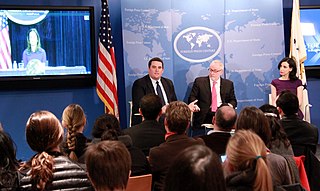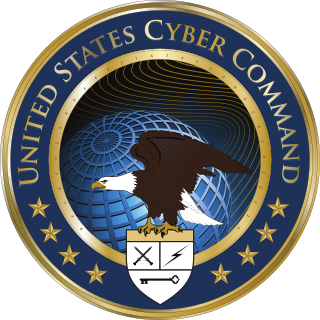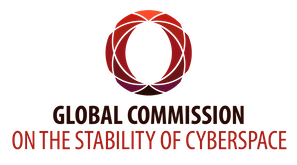Related Research Articles

Cyberspace is an interconnected digital environment. It is a type of virtual world popularized with the rise of the Internet. The term entered popular culture from science fiction and the arts but is now used by technology strategists, security professionals, governments, military and industry leaders and entrepreneurs to describe the domain of the global technology environment, commonly defined as standing for the global network of interdependent information technology infrastructures, telecommunications networks and computer processing systems. Others consider cyberspace to be just a notional environment in which communication over computer networks occurs. The word became popular in the 1990s when the use of the Internet, networking, and digital communication were all growing dramatically; the term cyberspace was able to represent the many new ideas and phenomena that were emerging. As a social experience, individuals can interact, exchange ideas, share information, provide social support, conduct business, direct actions, create artistic media, play games, engage in political discussion, and so on, using this global network. Cyberspace users are sometimes referred to as cybernauts.

Cybercrime encompasses a wide range of criminal activities that are carried out using digital devices and/or networks. These crimes involve the use of technology to commit fraud, identity theft, data breaches, computer viruses, scams, and expanded upon in other malicious acts. Cybercriminals exploit vulnerabilities in computer systems and networks to gain unauthorized access, steal sensitive information, disrupt services, and cause financial or reputational harm to individuals, organizations, and governments.

The United Nations Institute for Training and Research (UNITAR) is a dedicated training arm of the United Nations system. UNITAR provides training and capacity development activities to assist mainly developing countries with special attention to Least Developed Countries (LDCs), Small Island Developing States (SIDS) and other groups and communities who are most vulnerable, including those in conflict situations.
Ahmed Kamal was a Pakistani diplomat, most noted for his work at the United Nations. He served as a professional diplomat in the Ministry of Foreign Affairs of Pakistan for close to forty years until his retirement in 1999.

The United Nations Institute for Disarmament Research (UNIDIR) is a research institute of the United Nations focused on disarmament and international security. It was established in 1980 by the United Nations General Assembly with the stated purpose of informing states and the global community on questions of international security, and to assist with disarmament efforts so as to facilitate progress toward greater security and economic and social development for all.

Digital diplomacy, also referred to as Digiplomacy and eDiplomacy, has been defined as the use of the Internet and new information communication technologies to help achieve diplomatic objectives. However, other definitions have also been proposed. The definition focuses on the interplay between internet and diplomacy, ranging from Internet driven-changes in the environment in which diplomacy is conducted to the emergence of new topics on diplomatic agendas such as cybersecurity, privacy and more, along with the use of internet tools to practice diplomacy.

Jeff Moss, also known as Dark Tangent, is an American hacker, computer and internet security expert who founded the Black Hat and DEF CON computer security conferences.
A cyber force is a military branch of a nation's armed forces that conducts military operations in cyberspace and cyberwarfare. The world's first independent cyber force was the People's Liberation Army Strategic Support Force, which was established in 2015 and also serves as China's space force. As of 2022, the world's only independent cyber forces are the PLA Strategic Support Force, the German Cyber and Information Domain Service, Norwegian Cyber Defence Force, and the Singapore Digital and Intelligence Service.
Proactive cyber defense, means acting in anticipation to oppose an attack through cyber and cognitive domains. Proactive cyber defense can be understood as options between offensive and defensive measures. It includes interdicting, disrupting or deterring an attack or a threat's preparation to attack, either pre-emptively or in self-defence.
Information technology law(IT law) or information, communication and technology law (ICT law) (also called cyberlaw) concerns the juridical regulation of information technology, its possibilities and the consequences of its use, including computing, software coding, artificial intelligence, the internet and virtual worlds. The ICT field of law comprises elements of various branches of law, originating under various acts or statutes of parliaments, the common and continental law and international law. Some important areas it covers are information and data, communication, and information technology, both software and hardware and technical communications technology, including coding and protocols.

United States Cyber Command (USCYBERCOM) is one of the eleven unified combatant commands of the United States Department of Defense (DoD). It unifies the direction of cyberspace operations, strengthens DoD cyberspace capabilities, and integrates and bolsters DoD's cyber expertise which focus on securing cyberspace.

The military-digital complex (MDC) is the militarization of cyber operations by governments and corporations, often through monetary relationships between computer programmers in private companies and the military to combat the threat of cyber terrorism and warfare. Cyber operations since 2000 have increased dramatically, with the recent branch of the US Strategic Command the United States Cyber Command. Cyber operations has been defined by the Washington Post as,

The U.S. Fleet Cyber Command is an operating force of the United States Navy responsible for the Navy's information network operations, offensive and defensive cyber operations, space operations and signals intelligence. It was created in January 2010 "to deter and defeat aggression and to ensure freedom of action to achieve military objectives in and through cyberspace". U.S. Tenth Fleet was simultaneously reactivated as its force provider. Since it was founded, the command has grown into an operational force composed of more than 16,000 active and reserve sailors and civilians organized into 27 active commands, 40 Cyber Mission Force units, and 27 reserve commands around the world.
The Tallinn Manual, originally entitled, Tallinn Manual on the International Law Applicable to Cyber Warfare, is an academic, non-binding study on how international law, especially jus ad bellum and international humanitarian law, applies to cyber conflicts and cyber warfare. Between 2009 and 2012, the Tallinn Manual was written at the invitation of the Tallinn-based NATO Cooperative Cyber Defence Centre of Excellence by an international group of approximately twenty experts. In April 2013, the manual was published by Cambridge University Press.
Human rights in cyberspace is a relatively new and uncharted area of law. The United Nations Human Rights Council (UNHRC) has stated that the freedoms of expression and information under Article 19(2) of the International Covenant on Civil and Political Rights (ICCPR) include the freedom to receive and communicate information, ideas and opinions through the Internet.
The London Process is a series of multistakeholder meetings held biennially since 2011 under the name Global Conference on Cyberspace or GCCS. In each GCCS meeting, governments, the private sector and civil society gather to discuss and promote practical cooperation in cyberspace, to enhance cyber capacity building, and to discuss norms for responsible behavior in cyberspace. The London Process was proposed by British Foreign Secretary William Hague at the 2011 Munich Security Conference.
Schmitt analysis is a legal framework developed in 1999 by Michael N. Schmitt, leading author of the Tallinn Manual, for deciding if a state's involvement in a cyber-attack constitutes a use of force. Such a framework is important as part of international law's adaptation process to the growing threat of cyber-warfare. The characteristics of a cyber-attack can determine which legal regime will govern state behavior, and the Schmitt analysis is one of the most commonly used ways of analyzing those characteristics. It can also be used as a basis for training professionals in the legal field to deal with cyberwarfare.

The Global Commission on the Stability of Cyberspace was a multistakeholder Internet governance organization, dedicated to the creation of diplomatic norms of governmental non-aggression in cyberspace. It operated for three years, from 2017 through 2019, and produced the diplomatic norm for which it was chartered and seven others.

Alexandra Beth Carter is an American academic, mediator, media personality, negotiation trainer and author. She is a clinical professor of law at Columbia Law School (CLS), where she directs and teaches the Mediation Clinic.
Noura Aljizawi is a Toronto-based academic, activist, spokesperson, former refugee, and Syrian political opposition leader.
References
- ↑ "The Law of Cyber-Space - Author | The Ambassador's Club at the United Nations". www.un.int. Retrieved 2024-04-13.
- ↑ Kamal, Ahmad; UNITAR (2005). The law of cyber-space :: an invitation to the table of negotiations /: Ahmad Kamal. UNITAR.
- ↑ "THE LAW OF CYBER-SPACE - ProQuest". www.proquest.com. ProQuest 218136274 . Retrieved 2024-04-13.